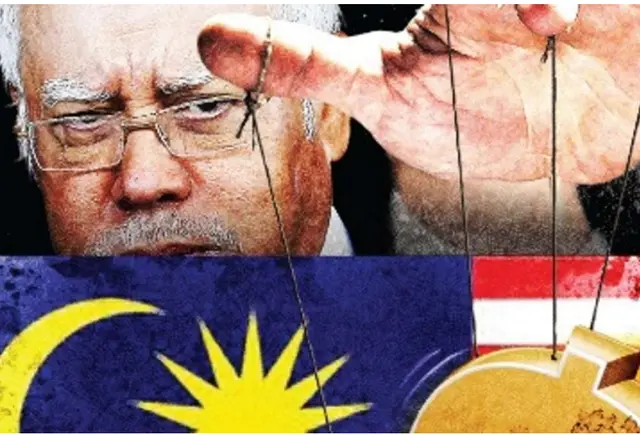The day US prosecutors alleged massive fraud at a Malaysian state fund, it was business as usual thousands of kilometres away for Prime Minister Najib Razak. Attending an evening feast for thousands of civil servants, he shook hands and posed for selfies.
The following day he showed up at the exhibition of a new sedan by the country’s top carmaker and held a national development planning meeting.
He only briefly addressed the US news, saying the Department of Justice action should be allowed to run its course.
The message was clear: the premier is focused on matters at home, especially the economy, as he seeks to preserve support among his ruling party’s base of ethnic Malays, many of them in rural areas. One of his pit stops on Thursday was a speech to employees of a government agency that is tasked with helping thousands of smallholder farmers.
Having already weathered a year of scandals over multimillion-dollar political donations, it would take a major development domestically to put the premier at risk of losing his job in the near term.
That’s even as the US civil suits seek to seize more than US$1 billion in assets that prosecutors allege was siphoned from troubled state fund 1Malaysia Development Berhad (1MDB), whose advisory board Najib chaired until recently. Najib has denied any wrongdoing.
“The market is quite clear that Najib is fairly secure at this stage and there isn’t too much of a political challenge to him,” said Vaninder Singh, a Singapore-based economist at Royal Bank of Scotland Plc. “As a consequence, what we’ve seen is that the impact from any 1MDB-related news stories on financial markets has come off significantly over the last few months.”
US investigators laid out their case on Wednesday that more than US$3.5 billion exited 1MDB fraudulently and was spent on paintings, luxury real estate and a Hollywood blockbuster, and at least US$700 million flowed into accounts controlled by a top Malaysian official whose description fits Najib.
The premier has previously acknowledged a similar amount went into his accounts before the 2013 general election. He has said the money was a private donation from the Saudi royal family and most of it was later returned.
Among those identified in the US suit was Najib’s stepson Riza Aziz and his associates. The US did not name any individuals as defendants.
There’s no immediate indication of whether the US will lodge criminal charges against Malaysian officials, and the chances of Najib being indicted at home appear low. Domestic investigations into 1MDB and into Najib’s actions have largely wrapped up. The attorney general concluded earlier this year that Najib did not engage in any graft.
As markets wobbled last year on the revelations of the money that reached Najib’s accounts – foreign funds sold a net 30.6 billion ringgit (HK$58 billion) of Malaysia stocks and bonds in 2015 and the ringgit fell 19 per cent – the premier moved swiftly to shore up support.
He fired detractors including his deputy prime minister, and curbed dissent within his United Malays National Organisation (Umno). An opposition in disarray, marked by periods of public infighting, has helped him.
In the aftermath of the US move, senior officials in Malaysia were quick to close ranks around Najib. History has shown the US can act too hastily and then be proven incorrect, one minister said, adding no 1MDB money is missing or stolen.
There is no evidence from any probe anywhere that funds were misappropriated, the attorney general said, expressing “strong concerns at the insinuations and allegations” against Najib.
(BLOOMBERG)
 简体中文
简体中文

